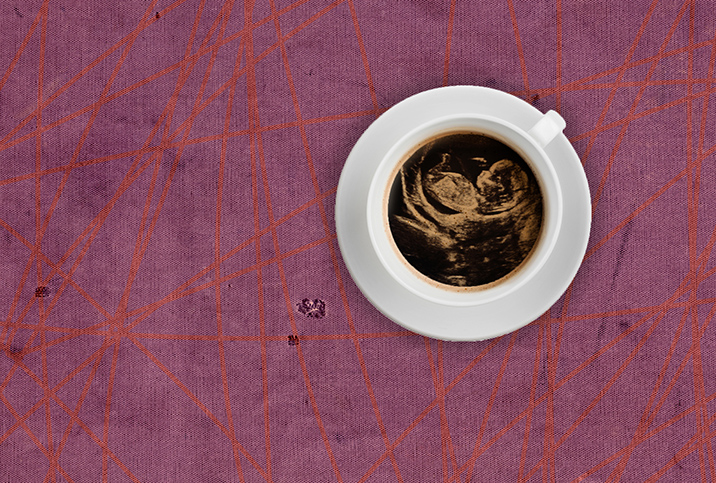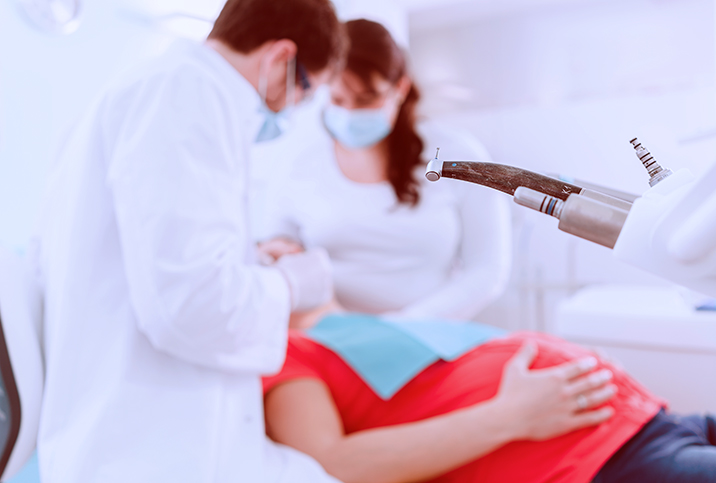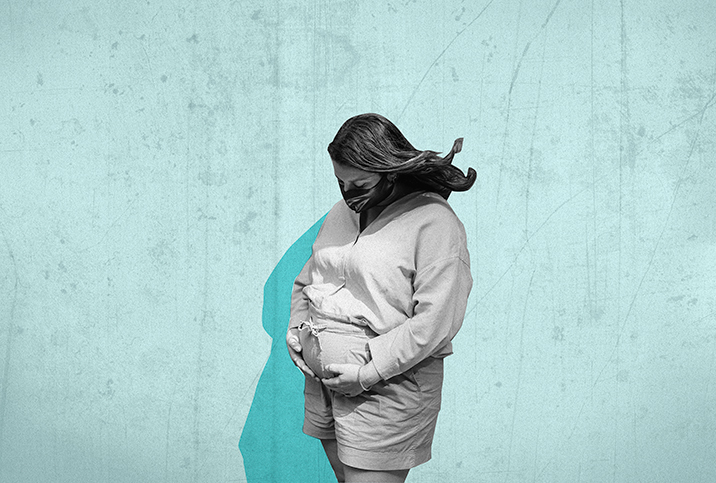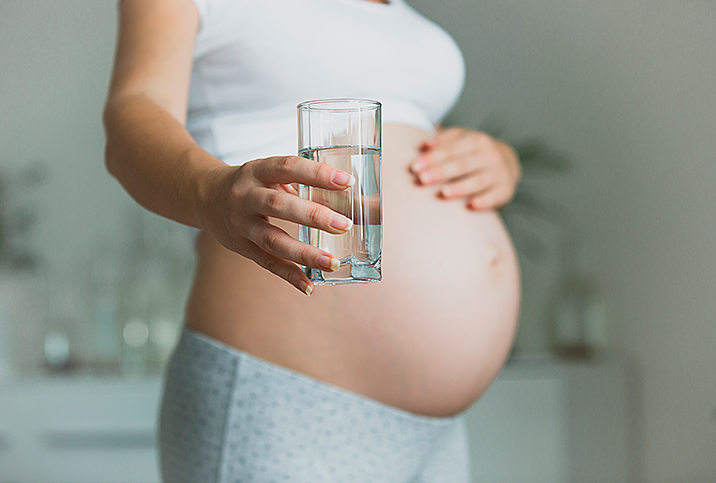Please Stop Believing These Pregnancy and Postpartum Inaccuracies
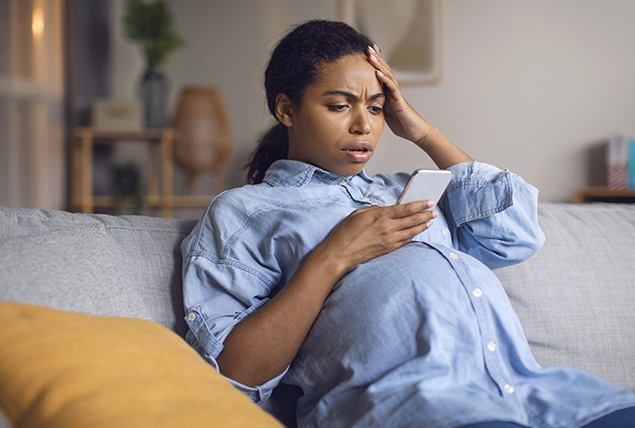
Pregnancy and childbirth can dramatically alter a woman's body. Everyone's experience is different, so it's difficult to predict how it will affect you.
Contrary to what some popular social media posts suggest, it's incredibly unlikely you'll lose a nipple, go blind or sweat blue during pregnancy—so let's dispel common pregnancy myths.
Why are pregnancy and delivery myths all over social media now?
Many sensational claims have entered the limelight since the publication of "The List," a viral compilation of 350 reasons not to have a baby (along with a few pros), but some have been circulating for years. In part, the pregnancy myths may be on the upswing because sensational posts drive engagement and attract followers on social media.
Most folks don't create such content maliciously and likely believe their claims to be valid, according to Hana Patel, M.B.B.S., a general practitioner and women's health specialist in London. Those individuals may even see creating and sharing that type of content as a way to help educate other birthing people.
Aside from the basics, some women may not have learned much about pregnancy and childbirth in school. Unlike in the past, when deliveries happened at home, most people haven't witnessed a birth in person.
Moreover, some women may lack access to healthcare and reliable resources. Distrust in the medical system is another issue heightened by the United States' maternal mortality and morbidity rate, which exceeds that of any other industrialized nation, according to a 2020 report.
As a result, women may be vulnerable, fearful and susceptible to false information.
"Women are not confident in their bodies. We do not understand what is happening to our body during our reproductive years," said Jo Parkington, a lead midwife at Lansinoh, a company offering breastfeeding and postpartum support in Leeds, England. "Many women do not understand fertility, pregnancy, birth or those early days of transitioning into parenthood."
In search of answers, some pregnant women turn to the internet, especially social media. Online resources can be incredibly valuable, especially for marginalized people and people without access to quality healthcare, but they can also be rife with false or misleading information.
Here, experts untangle fact from fiction for some of the most bizarre and widely spread claims about pregnancy, childbirth and the postpartum period.
Pregnant? Your baby won't 'steal' your bones
"I literally just realized that you can build a baby's bones in your body because they're STEALING *YOUR* BONES." So read a post by Ashley Ford in one of many mentions of this myth making the rounds on social media.
Technically, if a pregnant person isn't getting enough calcium, a fetus might siphon off some calcium from their mom's bones and teeth to help them develop, Patel said. That's highly preventable and unlikely, however.
"Our bones are in a constant state of making and breaking down bone tissue. High calcium demand during pregnancy could theoretically make bone breakdown quicker than the bone-building process," said Claudia Pastorelli Mosca, M.D., a Berlin-based OB-GYN and a medical advisor at Flo, an online female health platform. "However, our hormones, especially estrogen, play an essential role in regulating this build-and-destroy game.
"As we know, estrogen levels are naturally higher during pregnancy, and it plays an important role in regulating bone formation. So in healthy women, pregnant or lactating, a proper calcium intake should counterbalance calcium loss, preventing significant bone loss."
In rare instances, however, pregnancy-related osteoporosis—there's more bone loss than production—can occur, Pastorelli Mosca added. To combat that, get enough calcium and vitamin D from your diet, sources such as dairy, green vegetables (spinach, kale, broccoli) and fortified products. Also, exercise regularly.
Pregnancy doesn't cause tooth loss
"A woman on the Clock app said when she was pregnant two of her teeth just crumbled out of her mouth????," Camilla Blackett wrote in a post that earned more than 4,000 likes.
Dozens of comments reflect similar stories. Natalie Fiawoo responded, "I'm two pregnancies in and four teeth gone. Literally woke up with one just sitting in my mouth with pregnancy one, and with pregnancy two, one just fell out in the sink. Horror."
Up to 75 percent of pregnant people experience gingivitis, according to the Centers for Disease Control and Prevention (CDC). This is partly because pregnancy-related hormone changes make the gums more susceptible to bleeding and inflammation, which can make them more vulnerable to plaque and infection, Pastorelli Mosca said.
That doesn't mean you'll eat your baby's first birthday cake with dentures.
"There is truth to pregnancy hormones making your ligaments a bit looser, and that could also affect the structures that support the teeth," Pastorelli Mosca said. "But teeth suddenly rotting and falling out because of pregnancy itself is very unlikely and almost impossible."
Maintaining good oral hygiene—brush your teeth at least twice a day with fluoride toothpaste, floss and visit the dentist regularly—should be enough to prevent your teeth from falling out before, during or after pregnancy, she said.
Eating a healthy diet and limiting sugary foods can help as well, Parkington said.
Your nipple (probably) won't fall off
"Let me tell you how my nipple fell off," Jasmine Chiswell, a TikTok creator, told her 16.4 million followers in January. In the since-deleted video, Chiswell then clarified it hadn't detached completely but was hanging off her body and said she'd been warned this could happen.
"It is extremely unlikely for nipples to 'fall off' during breastfeeding," Pastorelli Mosca said. "While breastfeeding can sometimes present challenges, such as soreness or discomfort, severe complications that would cause this extreme outcome are rare."
One possible reason a nipple might partially detach is vasospasm, in which regional blood vessels contract, cutting off the blood supply to the area, she said. This could happen to any organ in the body, but when it affects the nipples, it can cause intense pain during or after breastfeeding.
"This condition is rare, and even rarer would be nipple necrosis, a severe complication that, theoretically, in extreme cases, could cause nipple damage, such as completely falling off," Pastorelli Mosca said.
Previous trauma or surgery that has weakened the nipple or surrounding tissue, such as piercings or breast augmentation or reduction, could increase the risk of complications, Parkington said.
"Instead of nipples falling off, what can more commonly occur is nipple fissures or problems that may occur during lactation. These issues can be caused by an improper latch, poor positioning or other factors," Pastorelli Mosca said.
It's essential for nursing people to know what an improper latch feels like and adjust it immediately, Parkington said. Professional support is important.
Women experiencing any issues with breastfeeding, including nipple pain, bleeding or discomfort, should talk to a healthcare professional to avoid complications.
Pregnancy doesn't make you blind
"I had 20/20 vision before my pregnancy with my second. My vision got terrible so fast while pregnant with him; everything was blurry unless it was no more than 2 feet in front of my face. Everyone assured me it would get better after giving birth; it never did," wrote Reddit user Pitiful-Trainer1213 in response to user mrs_who_are_yew's query: "Did pregnancy ruin your vision too?"
Vision changes such as blurriness and "floaters" are common during pregnancy, according to Cleveland Clinic. These are usually a result of hormones and dissipate after giving birth, but permanent blindness is extremely unlikely, despite what some viral TikTok videos have suggested.
"There is no direct link between pregnancy and blindness," Pastorelli Mosca said.
People like Pitiful-Trainer1213 who may have underlying issues, such as gestational diabetes, preeclampsia, type 2 diabetes or high blood pressure, may experience lasting effects. If these conditions aren't treated, permanent vision loss is possible, according to Patel. However, that's exceedingly rare and usually preventable.
Sudden vision changes are a sign of a complication and warrant immediate medical attention. Speak to your healthcare provider immediately if you begin to have these issues.
Pregnancy won't turn your sweat blue, either
In a video with more than 1.6 million views, TikTok user Cassidy Muteing described how pregnancy had changed the color of her sweat, causing her to unwittingly dye various items such as her toilet seat and sheets a blue hue.
In a follow-up, she said she had learned via Google that this was because of pregnancy hormones' effect on the sweat glands. Other users have shared similar experiences in the comments and in separate posts.
"I'm currently experiencing the weirdest pregnancy symptom I've ever heard of. I'm literally turning surfaces blue," TikTok user Keisha Sethi posted, along with photos of her freshly dyed sheets and shirt.
Pregnancy can cause people to sweat more, especially during the first trimester, but there is no evidence it affects composition or coloring.
A rare disorder of the sweat glands, called chromhidrosis, can cause sweat to turn different colors, including yellow, green, black, brown or blue, Patel and Parkington said. The condition is usually harmless and can affect anyone, including men and children.
It has nothing to do with pregnancy but is linked to consuming some food colorings, dyes, or medications or being exposed to heavy metals, according to a 2022 report.
The bottom line
Misinformation and disinformation aren't going away anytime soon. Still, there are ways to fact-check claims, including looking at a source's qualifications and references.
Look for credible studies or organizations such as the American Pregnancy Association or the American Congress of Obstetricians and Gynecologists.
If you have specific concerns about your health history or symptoms, skip the social media networks and speak to your doctor or other healthcare provider.












